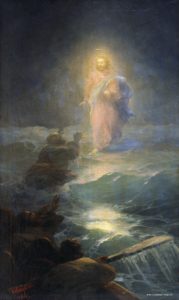Thoughts on Sunday’s Lessons for Aug. 13, 2017
First Reading (Track One): Genesis 37:1-4, 12-28Faith in the face of fear, faith as a source of strength: This idea shows up in Sunday’s readings in the stories of Joseph, threatened with death and then sold into slavery by his own brothers; and loyal Peter, confident that he can walk on Galilee’s choppy waters until his faith falls short and he starts to sink. In the first reading we follow the Old Testament’s dysfunctional first family into its fourth generation. Jacob’s son Joseph’s encounter with his brothers shows us again that even the patriarchs were flawed, broken, sometimes downright bad. Yet still God loved them, as God loves us, and all ends well.
First Reading (Track Two): 1 Kings 19:9-18
The Prophet Elijah is not in a happy place in Sunday’s reading. He is fleeing for his life from an angry Queen Jezebel, and he feels alone and angry. No one else is on his side. He despairs. But he hears the word of the Lord – an angel, a messenger – inviting him to go stand on the mountain to meet God. Soon a great wind shakes his world; then an earthquake and finally a fire shatter the scene; but God is not in any of those. It is in the silence which follows that God’s voice is finally heard. God reassures him, promising that Elijah will go on to appoint Israel’s kings and prophets.
Psalm (Track One): Psalm 105: 1-6, 16-22, 45b
Holding up Joseph as an example that God remains faithful even in hard times, the Psalm reminds us of Joseph’s life as a slave in Egypt, his feet bruised in fetters and his neck choked in a heavy iron collar. But God was faithful to Joseph, and through Joseph God saved the people. Joseph won Pharaoh’s trust and eventually rose to a place of power in the Egyptian court, master of the royal household and ruler of its possessions. God indeed does marvels that make our hearts rejoice.
Psalm (Track Two): Psalm 85:8-13
The reassurance that God gives to Elijah in his lonely fear is echoed in this beautiful Psalm segment: God has forgiven our iniquity and blotted out our sins. Heaven and earth meet in truth and righteousness; righteousness and peace share a tender kiss. God grants prosperity and a fruitful harvest, and all shall be well and all manner of things shall be well.
Second Reading: Romans 10:5-15
We return to Romans after a week’s break for the Transfiguration, and find Paul continuing to try to persuade Rome’s Gentile Christian community and its Jewish Christians to live in harmony and love one another. Salvation comes to us all through Jesus, he writes, and there is nothing we can do to earn it; Christ has done this all for us, with no distinction between Jew and Greek (Gentile). God is God of all. The word of faith is in us, and we are called to proclaim the good news of the Gospel so all may be saved.
Gospel: Matthew 14:22-33
The striking mental image of Jesus walking on the stormy waters of the Sea of Galilee makes this one of the most familiar Gospel stories. To try seeing it in a new way, imagine the scene as the apostles might have experienced it. Jesus had sent the apostles ahead to cross the sea without him so he could take some time to pray alone. Later, when they then saw Jesus walking calmly across the water toward them, they were afraid, until Jesus assured them. Then Peter tried to run across the water to meet Jesus. He managed a few steps … until his doubt started him sinking, reaching for Jesus’ saving hand. Do you think you would have trusted Jesus enough to step out of the boat?
What are “Track 1” and “Track 2”?
During the long green season after Pentecost, there are two tracks (or strands) each week for Old Testament readings. Within each track, there is a Psalm chosen to accompany the particular lesson.
The Revised Common Lectionary allows us to make use of either of these tracks, but once a track has been selected, it should be followed through to the end of the Pentecost season, rather than jumping back and forth between the two strands.
For more information from LectionaryPage.net, click here.

